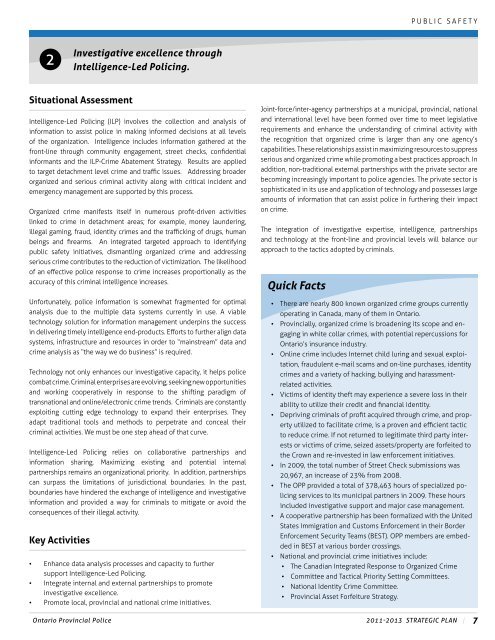OPP Strategic Plan - Police provinciale de l'Ontario
OPP Strategic Plan - Police provinciale de l'Ontario
OPP Strategic Plan - Police provinciale de l'Ontario
Create successful ePaper yourself
Turn your PDF publications into a flip-book with our unique Google optimized e-Paper software.
Investigative excellence through<br />
Intelligence-Led Policing.<br />
Situational Assessment<br />
Intelligence-Led Policing (ILP) involves the collection and analysis of<br />
information to assist police in making informed <strong>de</strong>cisions at all levels<br />
of the organization. Intelligence inclu<strong>de</strong>s information gathered at the<br />
front-line through community engagement, street checks, confi<strong>de</strong>ntial<br />
informants and the ILP-Crime Abatement Strategy. Results are applied<br />
to target <strong>de</strong>tachment level crime and traffic issues. Addressing broa<strong>de</strong>r<br />
organized and serious criminal activity along with critical inci<strong>de</strong>nt and<br />
emergency management are supported by this process.<br />
Organized crime manifests itself in numerous profit-driven activities<br />
linked to crime in <strong>de</strong>tachment areas; for example, money laun<strong>de</strong>ring,<br />
illegal gaming, fraud, i<strong>de</strong>ntity crimes and the trafficking of drugs, human<br />
beings and firearms. An integrated targeted approach to i<strong>de</strong>ntifying<br />
public safety initiatives, dismantling organized crime and addressing<br />
serious crime contributes to the reduction of victimization. The likelihood<br />
of an effective police response to crime increases proportionally as the<br />
accuracy of this criminal intelligence increases.<br />
Unfortunately, police information is somewhat fragmented for optimal<br />
analysis due to the multiple data systems currently in use. A viable<br />
technology solution for information management un<strong>de</strong>rpins the success<br />
in <strong>de</strong>livering timely intelligence end-products. Efforts to further align data<br />
systems, infrastructure and resources in or<strong>de</strong>r to “mainstream” data and<br />
crime analysis as “the way we do business” is required.<br />
Technology not only enhances our investigative capacity, it helps police<br />
combat crime. Criminal enterprises are evolving, seeking new opportunities<br />
and working cooperatively in response to the shifting paradigm of<br />
transnational and online/electronic crime trends. Criminals are constantly<br />
exploiting cutting edge technology to expand their enterprises. They<br />
adapt traditional tools and methods to perpetrate and conceal their<br />
criminal activities. We must be one step ahead of that curve.<br />
Intelligence-Led Policing relies on collaborative partnerships and<br />
information sharing. Maximizing existing and potential internal<br />
partnerships remains an organizational priority. In addition, partnerships<br />
can surpass the limitations of jurisdictional boundaries. In the past,<br />
boundaries have hin<strong>de</strong>red the exchange of intelligence and investigative<br />
information and provi<strong>de</strong>d a way for criminals to mitigate or avoid the<br />
consequences of their illegal activity.<br />
Key Activities<br />
•<br />
•<br />
•<br />
2<br />
Enhance data analysis processes and capacity to further<br />
support Intelligence-Led Policing.<br />
Integrate internal and external partnerships to promote<br />
investigative excellence.<br />
Promote local, provincial and national crime initiatives.<br />
Ontario Provincial <strong>Police</strong><br />
PUBLIC SAFETY<br />
Joint-force/inter-agency partnerships at a municipal, provincial, national<br />
and international level have been formed over time to meet legislative<br />
requirements and enhance the un<strong>de</strong>rstanding of criminal activity with<br />
the recognition that organized crime is larger than any one agency’s<br />
capabilities. These relationships assist in maximizing resources to suppress<br />
serious and organized crime while promoting a best practices approach. In<br />
addition, non-traditional external partnerships with the private sector are<br />
becoming increasingly important to police agencies. The private sector is<br />
sophisticated in its use and application of technology and possesses large<br />
amounts of information that can assist police in furthering their impact<br />
on crime.<br />
The integration of investigative expertise, intelligence, partnerships<br />
and technology at the front-line and provincial levels will balance our<br />
approach to the tactics adopted by criminals.<br />
Quick Facts<br />
•<br />
•<br />
•<br />
•<br />
•<br />
•<br />
•<br />
•<br />
•<br />
There are nearly 800 known organized crime groups currently<br />
operating in Canada, many of them in Ontario.<br />
Provincially, organized crime is broa<strong>de</strong>ning its scope and engaging<br />
in white collar crimes, with potential repercussions for<br />
Ontario’s insurance industry.<br />
Online crime inclu<strong>de</strong>s Internet child luring and sexual exploitation,<br />
fraudulent e-mail scams and on-line purchases, i<strong>de</strong>ntity<br />
crimes and a variety of hacking, bullying and harassmentrelated<br />
activities.<br />
Victims of i<strong>de</strong>ntity theft may experience a severe loss in their<br />
ability to utilize their credit and financial i<strong>de</strong>ntity.<br />
Depriving criminals of profit acquired through crime, and property<br />
utilized to facilitate crime, is a proven and efficient tactic<br />
to reduce crime. If not returned to legitimate third party interests<br />
or victims of crime, seized assets/property are forfeited to<br />
the Crown and re-invested in law enforcement initiatives.<br />
In 2009, the total number of Street Check submissions was<br />
20,967, an increase of 23% from 2008.<br />
The <strong>OPP</strong> provi<strong>de</strong>d a total of 378,463 hours of specialized policing<br />
services to its municipal partners in 2009. These hours<br />
inclu<strong>de</strong>d investigative support and major case management.<br />
A cooperative partnership has been formalized with the United<br />
States Immigration and Customs Enforcement in their Bor<strong>de</strong>r<br />
Enforcement Security Teams (BEST). <strong>OPP</strong> members are embed<strong>de</strong>d<br />
in BEST at various bor<strong>de</strong>r crossings.<br />
National and provincial crime initiatives inclu<strong>de</strong>:<br />
• The Canadian Integrated Response to Organized Crime<br />
• Committee and Tactical Priority Setting Committees.<br />
• National I<strong>de</strong>ntity Crime Committee.<br />
•<br />
Provincial Asset Forfeiture Strategy.<br />
2011-2013 <strong>Strategic</strong> <strong>Plan</strong> | 7



